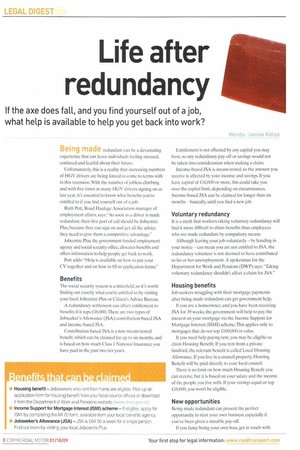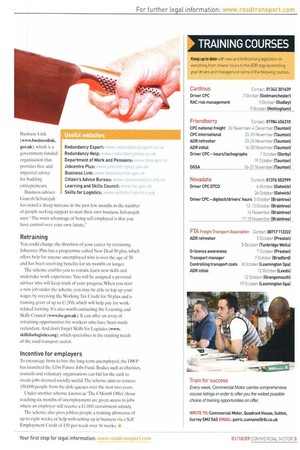Life after redundancy
Page 30

Page 31

If you've noticed an error in this article please click here to report it so we can fix it.
If the axe does fall, and you find yourself out of a job, what help is available to help you get back into work?
Being made redundant can be a devastating experience that can leave individuals feeling stressed, confused and fearful about their future.
Unfortunately, this is a reality that increasing numbers of HGV drivers are being forced to come to terms with in this recession. With the number of jobless climbing, and with five times as many HGV drivers signing on as last year, it's essential to know what benefits you're entitled to if you find yourself out of a job.
Ruth Pott, Road Haulage Association manager of employment affairs, says: As soon as a driver is made redundant, their first port of call should be Jobcentre Plus, because they can sign on and get all the advice they need to give them a competitive advantage.
Jobcentre Plus, the government-funded employment agency and social security office, allocates benefits and offers information to help people get back to work.
Pott adds: "Help is available on how to put your CV together and on how to fill in application forms.
Benefits The social security system is a minefield, so it's worth finding out exactly what you're entitled to by visiting your local Jobcentre Plus or Citizen's Advice Bureau.
A redundancy settlement can affect entitlement to benefits if it tops £16,000. There arc two types of Jobseeker's Allowance (iSA): contribution-based JSA and income-based JSA.
Contribution-based JSA is a non-means-tested benefit, which can be claimed for up to six months, and is based on how much Class 1 National Insurance you have paid in the past two tax years. Entitlement is not affected by any capital you may have, so any redundancy pay-off or savings would not be taken into consideration when making a claim.
Income-based JSA is means-tested, so the amount you receive is affected by your income and savings. If you have capital of £16,000 or more, this could take you over the capital limit, depending on circumstances. Income-based JSA can be claimed for longer than six months basically, until you find a new job.
Voluntary redundancy It is a myth that workers taking voluntary redundancy will find it more difficult to claim benefits than employees who are made redundant by compulsory means.
Although leaving your job voluntarily by handing in your notice can mean you are not entitled to JSA, the redundancy volunteer is not deemed to have contributed to his or her unemployment. A spokesman for the Department for Work and Pensions (DWP) says: "Taking voluntary redundancy shouldn't affect a claim for JSA."
Housing benefits Job-seekers struggling with their mortgage payments after being made redundant can get government help.
If you are a homeowner, and you have been receiving JSA for 39 weeks, the government will help to pay the interest on your mortgage via the Income Support for Mortgage Interest (ISMI) scheme. This applies only to mortgages that do not top £100,000 in value.
If you need help paying rent, you may be eligible to claim Housing Benefit. If you rent from a private landlord, the relevant benefit is called Local Housing Allowance. If you live in a council property, Housing Benefit will be paid directly to your local council.
There is no limit on how much Housing Benefit you can receive, but it is based on your salary and the income of the people you live with. If your savings equal or top £16,000, you won't be eligible.
New opportunities Being made redundant can present the perfect opportunity to start your own business, especially if you've been given a sizeable pay-off.
If you fancy being your own boss, get in touch with
Business Link (www.businesslink. gov.uk), which is a government-funded organisation that provides free and impartial advice for budding entrepreneurs. Learning and Skills Council: .-Av..tsc..gov.tik Business adviser Skills for Logistics: www.skillstortogistics.org Ganesh Selvarajah has noted a sharp increase in the past few months in the number of people seeking support to start their own business. Selvarajah says: "The main advantage of being self-employed is that you have control over your own future."
Retraining
You could change the direction of your career by retraining. Jobcentre Plus has a programme called New Deal 50 plus, which offers help for anyone unemployed who is over the age of 50 and has been receiving benefits for six months or longer.
The scheme enables you to retrain. learn new skills and undertake work experience. You will be assigned a personal adviser who will keep track of your progress. When you start a new job under the scheme, you may be able to top up your wages by receiving the Working Tax Credit for 50 plus and a training grant of up to £1,500, which will help pay for workrelated training. It's also worth contacting the Learning and Skills Council (www.lsc.govalk). It can offer an an-ay of retraining opportunities for workers who have been made redundant. And don't forget Skills for Logistics (www. skillsforlogistimorg), which specialises in the training needs of the road transport sector.
Incentive for employers
to encourage firms to hire the long-term unemployed, the DWP has launched the lbn Future Jobs Fund. Bodies such as charities. councils and voluntary organisations can bid for the cash to create jobs deemed socially useful.The scheme aims to remove 150,000 people from the dole queues over the next two years.
Under another scheme, known as 'The 6 Month Offer; those reaching six months of unemployment are given access to jobs where an employer will receive a £1,000 recruitment subsidy The scheme also gives jobless people a training allowance of up to eight weeks, or help with setting up in business via a Self Employment Credit of .E50 per week over 16 weeks s












































































































































